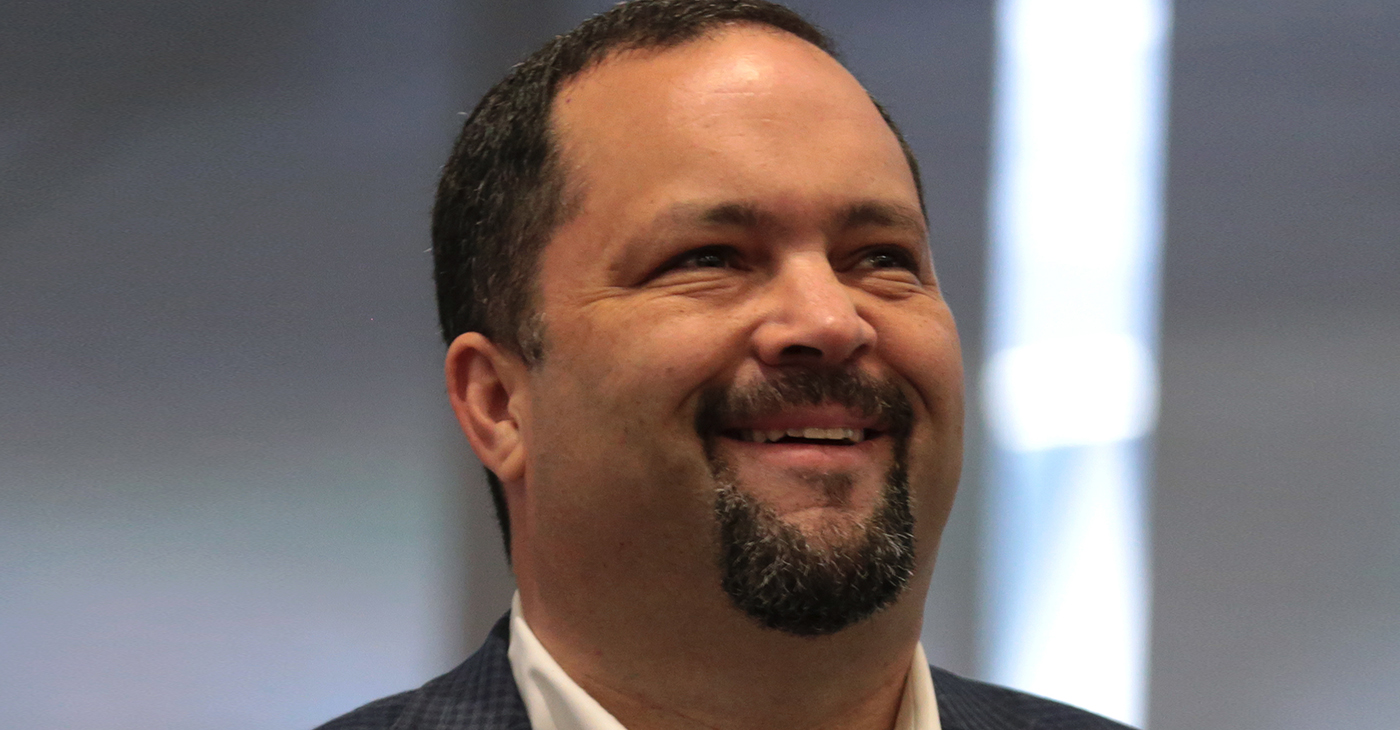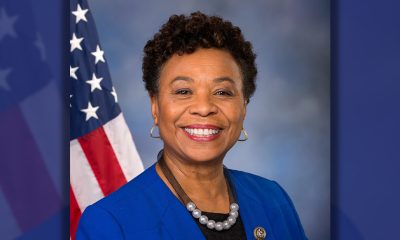Activism
COMMENTARY: From MLK’s Alma Mater and John Lewis’ District, Reminders of the Power of Direct Action
I believe that the president’s call to action was a reminder of the power of direct action. And a reminder of the power of the people — that when it comes to preserving voting rights and our democracy, we must all remain vigilant and willing to act with what Dr. King called “the fierce urgency of now.”

By Ben Jealous, President of People For the American Way
President Joe Biden could have delivered his recent voting rights message to U.S. senators from the White House just down Pennsylvania Avenue from the Capitol. Instead, he and Vice President Kamala Harris traveled to Atlanta a few days before Martin Luther King Jr. Day. It was the perfect place for the president’s powerful message urging senators to be on the right side of history by doing whatever it takes to get voting rights legislation passed and put on the president’s desk.
The president and vice president visited King’s church before traveling to Morehouse College, King’s alma mater. They spoke in a place represented long and nobly by the late civil rights champion and congressman John Lewis.
I was honored to be in attendance, surrounded by friends and colleagues in the voting rights movement. History was all around us. I could feel the presence of so many witnesses, including those who gave their very lives to the cause.
I had to think that Dr. King and the late Rep. John Lewis would appreciate that some of us sitting in the front row for the president’s speech had been on the front lines just a few weeks earlier. We were arrested outside the White House while urging the president to put the full power of the presidency behind a push for voting rights protections.
King and Lewis had great strategic understanding of the power of nonviolent direct action to highlight injustice, to motivate supporters, to stir the conscience of those on the sidelines — and sometimes to light a fire under allies
The invitation extended by the White House to those of us arrested outside its gates in November was a sign that the president appreciates the urgency that drove our direct action.
President Lyndon Johnson and Martin Luther King were partners in passing civil and voting rights laws, and each understood that movement leaders had a different role to play than the politicians.
Some voting rights advocates held a sit-in inside the White House itself just days before President Johnson made his famous “We Shall Overcome” speech calling on Congress to uphold American ideals by passing voting rights legislation.
Voting rights advocates have known all along that Biden was an ally. He has publicly criticized the wave of voting restrictions passed by Republican states after record voter turnout in 2022 led to former President Donald Trump’s defeat. We respected the importance of other items on the president’s legislative agenda, including investments in infrastructure and the American people.
But we watched with increasing alarm as Republicans in the U.S. senate used filibuster rules to repeatedly block action on federal voting rights bills that are needed to override voter suppression and brazen election subversion schemes being put in place in key states. We saw time running out to reverse these changes before the 2022 elections.
So, we took to the streets and called on the president to make the case to U.S. senators that the right to vote is far more important to our democracy than the current version of the Senate’s filibuster rules.
Biden rose to the occasion in Atlanta. “To protect our democracy, I support changing the Senate rules, whichever way they need to be changed, to prevent a minority of senators from blocking action on voting rights,” he said. “When it comes to protecting majority rule in America, the majority should rule in the United States Senate.”
“I will not yield,” Biden said. “I will not flinch. I will defend the right to vote and our democracy against all enemies, foreign, and yes, domestic.”
I believe that the president’s call to action was a reminder of the power of direct action. And a reminder of the power of the people — that when it comes to preserving voting rights and our democracy, we must all remain vigilant and willing to act with what Dr. King called “the fierce urgency of now.”
Ben Jealous serves as president of People For the American Way. Jealous has decades of experience as a leader, coalition builder, campaigner for social justice and seasoned nonprofit executive.
Activism
Oakland Post: Week of April 17 – 23, 2024
The printed Weekly Edition of the Oakland Post: Week of April 17 – 23, 2024

To enlarge your view of this issue, use the slider, magnifying glass icon or full page icon in the lower right corner of the browser window. ![]()
Activism
Oakland Schools Honor Fred Korematsu Day of Civil Liberties
Every Jan. 30, OUSD commemorates the legacy of Fred Korematsu, an Oakland native, a Castlemont High School graduate, and a national symbol of resistance, resilience, and justice. His defiant stand against racial injustice and his unwavering commitment to civil rights continue to inspire the local community and the nation. Tuesday was “Fred Korematsu Day of Civil Liberties and the Constitution” in the state of California and a growing number of states across the country.

By Post Staff
Every Jan. 30, OUSD commemorates the legacy of Fred Korematsu, an Oakland native, a Castlemont High School graduate, and a national symbol of resistance, resilience, and justice.
His defiant stand against racial injustice and his unwavering commitment to civil rights continue to inspire the local community and the nation. Tuesday was “Fred Korematsu Day of Civil Liberties and the Constitution” in the state of California and a growing number of states across the country.
One OUSD school is named in his honor: Fred T. Korematsu Discovery Academy (KDA) elementary in East Oakland.
Several years ago, founding KDA Principal Charles Wilson, in a video interview with anti-hate organization “Not In Our Town,” said, “We chose the name Fred Korematsu because we really felt like the attributes that he showed in his work are things that the children need to learn … that common people can stand up and make differences in a large number of people’s lives.”
Fred Korematsu was born in Oakland on Jan. 30, 1919. His parents ran a floral nursery business, and his upbringing in Oakland shaped his worldview. His belief in the importance of standing up for your rights and the rights of others, regardless of race or background, was the foundation for his activism against racial prejudice and for the rights of Japanese Americans during World War II.
At the start of the war, Korematsu was turned away from enlisting in the National Guard and the Coast Guard because of his race. He trained as a welder, working at the docks in Oakland, but was fired after the bombing of Pearl Harbor in 1941. Fear and prejudice led to federal Executive Order 9066, which forced more than 120,000 Japanese Americans out of their homes and neighborhoods and into remote internment camps.
The 23-year-old Korematsu resisted the order. He underwent cosmetic surgery and assumed a false identity, choosing freedom over unjust imprisonment. His later arrest and conviction sparked a legal battle that would challenge the foundation of civil liberties in America.
Korematsu’s fight culminated in the Supreme Court’s initial ruling against him in 1944. He spent years in a Utah internment camp with his family, followed by time living in Salt Lake City where he was dogged by racism.
In 1976, President Gerald Ford overturned Executive Order 9066. Seven years later, the 9th Circuit Court of Appeals in San Francisco vacated Korematsu’s conviction. He said in court, “I would like to see the government admit that they were wrong and do something about it so this will never happen again to any American citizen of any race, creed, or color.”
Korematsu’s dedication and determination established him as a national icon of civil rights and social justice. He advocated for justice with Rosa Parks. In 1998, President Bill Clinton gave him the Presidential Medal of Freedom saying, “In the long history of our country’s constant search for justice, some names of ordinary citizens stand for millions of souls … To that distinguished list, today we add the name of Fred Korematsu.”
After Sept. 11, 2001, Korematsu spoke out against hatred and discrimination, saying what happened to Japanese Americans should not happen to people of Middle Eastern descent.
Korematsu’s roots in Oakland and his education in OUSD are a source of great pride for the city, according to the school district. His most famous quote, which is on the Korematsu elementary school mural, is as relevant now as ever, “If you have the feeling that something is wrong, don’t be afraid to speak up.”
Activism
WOMEN IMPACTING THE CHURCH AND COMMUNITY
Juanita Matthews, better known as “Sister Teacher,” is a walking Bible scholar. She moved to California from the great state of Arkansas in 1971. Sister Teacher has a passion for teaching. She has been a member of Bible Fellowship Missionary Baptist Church since 1971.

Sister Juanita Matthews
55 Years with Oakland Public School District
The Teacher, Mother, Community Outreach Champion, And Child of God
Juanita Matthews, better known as “Sister Teacher,” is a walking Bible scholar. She moved to California from the great state of Arkansas in 1971. Sister Teacher has a passion for teaching. She has been a member of Bible Fellowship Missionary Baptist Church since 1971. She followed her passion for teaching, and in 1977 became the lead teacher for Adult Class #6. Her motto still today is “Once My Student, Always My Student”.
Beyond her remarkable love for the Lord, Sister Teacher has showcased her love for teaching by working for the Oakland Unified School District for 55 years, all but four of those years spent at Emerson Elementary and Child Development School. She truly cares about her students, making sure they have the tools/supplies needed to learn either at OUSD or Bible Fellowship Missionary Baptist Church.
She’s also had a “Clothes Closet Ministry” for 51 years, making sure her students have sufficient clothing for school. The Clothes Closet Ministry extends past her students, she has been clothing the community for over 50 years as well. She loves the Lord and is a servant on a mission. She is a loving mother to two beautiful children, Sandra and Andre. This is the impact this woman of God has on her church and the community.
-

 Activism4 weeks ago
Activism4 weeks agoOakland Post: Week of March 27 – April 2, 2024
-

 #NNPA BlackPress4 weeks ago
#NNPA BlackPress4 weeks agoCOMMENTARY: D.C. Crime Bill Fails to Address Root Causes of Violence and Incarceration
-

 #NNPA BlackPress4 weeks ago
#NNPA BlackPress4 weeks agoMayor, City Council President React to May 31 Closing of Birmingham-Southern College
-

 #NNPA BlackPress4 weeks ago
#NNPA BlackPress4 weeks agoBeloved Actor and Activist Louis Cameron Gossett Jr. Dies at 87
-

 Community1 week ago
Community1 week agoFinancial Assistance Bill for Descendants of Enslaved Persons to Help Them Purchase, Own, or Maintain a Home
-

 Activism3 weeks ago
Activism3 weeks agoOakland Post: Week of April 3 – 6, 2024
-

 Business1 week ago
Business1 week agoV.P. Kamala Harris: Americans With Criminal Records Will Soon Be Eligible for SBA Loans
-

 Activism2 weeks ago
Activism2 weeks agoOakland Post: Week of April 10 – 16, 2024






















































